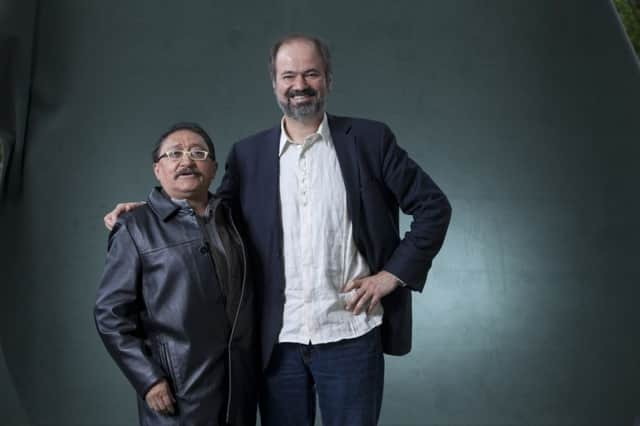Book festival: Mexico drug wars | Kirsty Logan | AL Kennedy


In Mexico, where the “War on Drugs” has killed 150,000 in the last eight years, they know better. Which is why Gabriel Orozco, the Mexican artist curating one of the most fascinating strands of this year’s festival, insisted on bringing over Sergio González Rodriguez and Juan Villoro – two (in his words) “legendary” essayists and journalists. And anyone who was in their event yesterday will be glad that he did.
Sergio Gonzalez Rodriguez – the man who called for that round of applause for journalists – was himself a victim of the drugs gangs, kidnapped and tortured for daring to investigate a series of murders of women along the US border. This is, sadly, not an unusual occurrence: as Villoro pointed out, in his own state of Veracruz, 15 journalists have been killed in the last four years. Naturally, there are no suspects. Only in Iraq have more journalists been murdered.
Advertisement
Hide AdThe best Book Festival events are those which make you see the world in a different way. This one did that by making us imagine what this country would be like if 2,000 guns were smuggled daily across our border and our police only recovered 200 of them. Or if that border was the longest between the first world and the third, and the country on the other side had the world’s highest consumption of drugs. Or why – and to me this is one of the hardest things of all to understand – why, when Hispanic culture is spreading mightily in the US, does its southern neighbour still seem so alien, its leading writers neglected and untranslated?
Earlier, listening to Kirsty Logan talk about her “adult fairytale” novel The Gracekeepers in her event with Icelandic writer Jon Kalman Stefansson, I was struck by her explanation of how it began to form in her head. Her father had died, and she was still grieving. As she had never lost anyone close to her before, grief seemed strange, and part of its strangeness lay in her not knowing how long it would last.
Still grieving, she saw a buoy in the sea. It looked like a birdcage. So she imagined it WAS a birdcage, and that the bird would live in a cage floating above the water, which would be a marker for a grave. The person tending the bird would be called a Gracekeeper, and mourning would take place as long as the bird were alive. At this point, not only can you get a hint of richness of Logan’s imagination (her imagined world is far more complex and complete than this) but how even fairytale-like stories might help bring consolation.
Back to the Mexicans. Because, according to Villoro, precisely that kind of consolation isn’t available to them anymore. Growing up in Veracruz (home port, according to one account, of the real ship that the Hispaniola was based on), Treasure Island was one of his favourite books. The thrill of the danger Jim Hawkins faced, though, was always accompanied by the certainty that all would turn out all right in the end.
Now that feeling of safety-in-danger is gone, and he feels lost in his own country – yet for all its pain and violence, it remains somewhere for which both he and Rodriguez feel a perverse pride. “The most radical act is to create something,” he concluded. “In the midst of this inferno, trying to imagine a paradise is important.”
For AL Kennedy, paradise almost certainly includes a Time Lord with a long scarf, ideally the “real one” – the one in his fourth small-screen incarnation, the one she loved watching Doctor Who in the Seventies: Tom Baker. Like Villoro then but not now, she’d be secretly certain that he would ensure that good would triumph over evil (“after all, Daleks couldn’t go anywhere apart from on linoleum and were only armed with a sink plunger and a whisk”) but that he would triumph without excessive violence but with plenty of panache. And talking of panache, only someone with Kennedy’s abundance of it could possibly follow her Doctor Who novel The Drosten’s Curse with something like Serious Sweet, out next year, from which she read for the first time. “It’s just a happy love story,” she told chair Stuart Kelly. And if you believe that …
Advertisement
Hide AdAll of which leaves me no room in which to do justice to either Andrew Scull’s discussion of madness or Monday evening’s James Tait Black awards. All I can do is to point you towards the books – respectively Madness and Civilization and, for the winners of Britain’s oldest literary prize, debut novelist Zia Haider Rahman for In the Light of What We Know and, in the non-fiction category, Richard Benson’s The Valley. Go on, get reading…